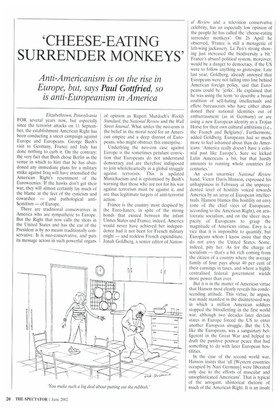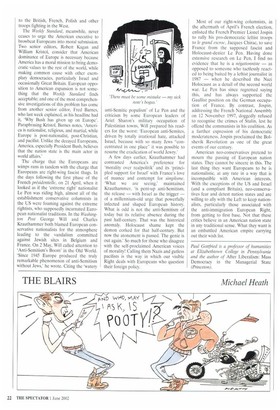'CHEESE-EATING SURRENDER MONKEYS'
Anti-Americanism is on the rise in
Europe, but, says Paul Gottfried, so
is anti-Europeanism in America
Elizabethtown, Pennsylvania FOR several years now, but especially since the terrorist attacks on 11 September, the establishment American Right has been conducting a sneer campaign against Europe and Europeans. George Bush's visit to Germany, France and Italy has done nothing to curb it. On the contrary: the very fact that Bush chose Berlin as the venue in which to hint that he has abandoned any immediate plans for a military strike against Iraq will have intensified the American Right's resentment of the Euroweenies. If the hawks don't get their war, they will almost certainly lay much of the blame at the feet of the cynicism and cowardice — and pathological antiSemitism — of Europe.
There are traditional conservatives in America who are sympathetic to Europe. But the Right that now calls the shots in the United States and has the ear of the President is by no means traditionally conservative. It is neo-conservative, and puts its message across in such powerful organs
of opinion as Rupert Murdoch's Weekly Standard, the National Review and the Wall Street Journal. What unites the neo-cons is the belief in the moral need for an American empire and a deep distrust of Europeans, who might obstruct this enterprise.
Underlying the neo-con case against Europe is the sometimes petulant conviction that Europeans do not understand democracy and are therefore indisposed to join wholeheartedly in a global struggle against terrorists. This is updated Manichaeism and is epitomised by Bush's warning that those who are not for his war against terrorism must be against it, and are thus legitimate targets of anti-terrorist action.
France is the country most despised by the Euro-haters, in spite of the strong bonds that existed between the infant Unites States and France; indeed, America would never have achieved her independence had it not been for French military might — and reckless French expenditure. Jonah Goldberg, a senior editor of Nation al Review and a television conservative celebrity, has an especially low opinion of the people he has called the 'cheese-eating surrender monkeys'. On 26 April he observed, 'France is still a menagerie of left-wing jackassery. Le Pen's strong showing just increased the biodiversity a bit.' France's absurd political system, moreover, would be a danger to democracy, if the US were to follow anything so grotesque. Late last year, Goldberg, already annoyed that Europeans were not falling into line behind American foreign policy, said that Europeans could be 'jerks'. He explained that he was using the term 'to describe a broad coalition of self-hating intellectuals and effete bureaucrats who have either abandoned their national identities out of embarrassment (as in Germany) or are using a new European identity as a Trojan Horse for their own cultural ambitions (i.e., the French and Belgians)'. Furthermore, added Goldberg, Europeans had so much more to feel ashamed about than do Americans: 'America really doesn't have a colonial past like Europe's. Sure we kicked Latin Americans a bit, but that hardly amounts to running whole countries for centuries.'
An even smarmier National Review hand, Victor Davis Hanson, expressed his unhappiness in February at the unprecedented level of hostility voiced towards America by an array of European intellectuals. Hanson blames this hostility on envy (one of the chief vices of Europeans, according to the American Right), on aristocratic socialism, and on the sheer incapacity of Europeans to grasp the magnitude of American virtue. Envy is a vice that it is impossible to quantify, but Europeans whom I know insist that they do not envy the United States. Some, indeed, pity her. As for the charge of socialism — that's a bit rich coming from the citizen of a country where the average family of four pays about 40 per cent of their earnings in taxes, and where a highly centralised federal government wields more power than ever.
But it is in the matter of American virtue that Hanson most clearly reveals his condescending attitude. This virtue, he argues, was made manifest in the disinterested way in which a million American soldiers stopped the bloodletting in the first world war, although two decades later deviant states in Europe forced the US to enter another European struggle. But the US, like the Europeans, was a sanguinary belligerent in the Great War and helped to draft the punitive postwar peace that had something to do with later European hostilities.
In the case of the second world war, Hanson insists that 'all [Western countries occupied by Nazi Germany] were liberated only due to the efforts of muscular and unsophisticated Americans'. That is typical of the arrogant, ahistorical rhetoric of much of the American Right. It is an insult to the British, French, Polish and other troops fighting in the West.
The Weekly Standard, meanwhile, never ceases to urge the American executive to browbeat Europeans into moral submission. Two senior editors, Robert Kagan and William Kristol, consider that American dominance of Europe is necessary because America has a moral mission to bring democratic values to the rest of the world, while making common cause with other exemplary democracies, particularly Israel and occasionally Great Britain. European opposition to American expansion is not something that the Weekly Standard finds acceptable; and one of the most comprehensive investigations of this problem has come from another senior editor, Fred Barnes, who last week explained, as his headline had it, 'Why Bush has given up on Europe'. Paraphrasing Kristol, Barnes notes, 'America is nationalist, religious, and martial, while Europe is post-nationalist, post-Christian, and pacifist. Unlike the decayed Europeans, America, especially President Bush, believes that the nation state is the main actor in world affairs.'
The charge that the Europeans are wimps runs in tandem with the charge that Europeans are right-wing fascist thugs. In the days following the first phase of the French presidentielle, on 21 April, when it looked as if the 'extreme right nationalist Le Pen was riding high, almost all of the establishment conservative columnists in the US were foaming against the extreme rightists, who supposedly incarnated European nationalist traditions. In the Washington Post George Will and Charles Krauthammer both blamed European conservative nationalists for the atmosphere leading to the vandalism committed against Jewish sites in Belgium and France. On 2 May, Will called attention to 'Anti-Semitism's Boom' in the Old World. 'Since 1945 Europe produced the truly remarkable phenomenon of anti-Semitism without Jews,' he wrote. Citing the 'watery
anti-Semitic populism' of Le Pen and the criticism by some European leaders of Ariel Sharon's military occupation of Palestinian towns, Will prepared his readers for the worst: 'European anti-Semites, driven by totally irrational hate, attacked Israel, because with so many Jews "concentrated in one place" it was possible to resume the eradication of world Jewry.'
A few days earlier, Krauthammer had contrasted America's preference for 'morality over realpolitik' and its 'principled support for Israel' with France's love of nuance and contempt for simplisme. 'What we are seeing,' maintained Krauthammer, 'is pent-up anti-Semitism, the release — with Israel as the trigger — of a millennium-old urge that powerfully infected and shaped European history. What is odd is not the anti-Semitism of today but its relative absence during the past half-century. That was the historical anomaly. Holocaust shame kept the demon corked for that half-century. But now the atonement is passed. The genie is out again.' So much for those who disagree with the self-proclaimed American voices of morality! Calling them Nazis and gutless pacifists is the way in which our visible Right deals with Europeans who question their foreign policy. Most of our right-wing columnists, in the aftermath of April's French election, enlisted the French Premier Lionel Jospin to rally his pro-democratic leftist troops to le grand escroc, Jacques Chirac, to save France from the supposed fascist and Holocaust-denier Le Pen. Having done extensive research on Le Pen, I find no evidence that he is a negationniste — as opposed to someone who tactlessly reacted to being baited by a leftist journalist in 1987 — when he described the Nazi Holocaust as a detail of the second world war. Le Pen has since regretted saying this, and has always supported the Gaullist position on the German occupation of France. By contrast, Jospin, addressing the French National Assembly on 12 November 1997, doggedly refused to recognise the crimes of Stalin, lest he offend the communists in his coalition. As a further expression of his democratic moderateness, Jospin proclaimed the Bolshevik Revolution as one of the great events of our century.
American neo-conservatives pretend to mourn the passing of European nation states. They cannot be sincere in this. The last thing they want Europeans to be is nationalistic, at any rate in a way that is incompatible with American interests. With the exceptions of the US and Israel (and a compliant Britain), neo-conservatives fear and detest nation states and are willing to ally with the Left to keep nationalists, particularly those associated with the anti-immigration European Right, from getting to first base. Not that these critics believe in an American nation state in any traditional sense. What they want is an embattled American empire carrying out their wish list.
Paul Gottfried is a professor of humanities at Elizabethtown College in Pennsylvania and the author of After Liberalism: Mass Democracy in the Managerial State (Princeton).







































































 Previous page
Previous page